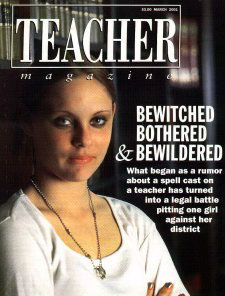 In 1999 Brandi Blackbear was suspended twice from an Oklahoma middle school for allegedly practicing Wicca. According to reports, the school accused her of casting a magic spell that caused a teacher to become sick. In October 2000 the American Civil Liberties Union of Oklahoma filed a lawsuit against Union Public Schools with complaints of religious discrimination and a violation of due process rights. The case became known as the “The Union Witch Trial”.
In 1999 Brandi Blackbear was suspended twice from an Oklahoma middle school for allegedly practicing Wicca. According to reports, the school accused her of casting a magic spell that caused a teacher to become sick. In October 2000 the American Civil Liberties Union of Oklahoma filed a lawsuit against Union Public Schools with complaints of religious discrimination and a violation of due process rights. The case became known as the “The Union Witch Trial”.
In 2002 U.S. District Judge Claire Eagan ruled in favor of the school district stating that “Neither of Blackbear’s two suspensions in 1999 violated her constitutional rights…” Posted on freedomforum.org, the 2002 AP article adds:
Blackbear testified during a deposition that she is not, has never been, and has never wanted to be a Wiccan. The judge also said ‘Blackbear admitted that the defendants have not done anything to keep her from practicing any religion …’ (Reported 7-20-2002)
In December Tulsa World published a follow-up article reporting that all appeals and all fees had been dropped. The Blackbear family moved on.
However that was not the end of the road for Brandi’s story. By 2002 “The Union Witch Trial” had gained some notoriety through national media reports, such as People magazine and The Today Show. Over the next few years, Brandi’s story was cited in a variety of books and journals (e.g., Paganism: Contemporary Paganism: Minority Religions in a Majoritarian America by Carol Barner-Barry; Where to Park Your Broomstick: A Teen’s Guide to Witchcraft By Lauren Manoy.) Then in 2006 the Lifetime TV Network produced a movie called Not Like Everyone Else based on the case.

Still from Lifetime Original Movie “Not Like Everyone Else” (2006)
That should have been the end of the road. Yet here we are eight years later reporting on the case. Why has “The Union Witch Trial” suddenly become newsworthy again? The answer to that question lies not with Brandi, the fight for religious freedom or witchcraft but with the state of traditional news media within our digitally-dependent world.
Over this past week “The Union Witch Trial” resurfaced online as “breaking news.” That story was shared via Facebook, Twitter, Reddit, private blogs and other similar sites. While some users recognized the story’s age, many did not. The story’s currency was substantiated by professional news bloggers and trusted media outlets who had published the story with a 2014 postdate (e.g., Esquire Magazine’s Politics Blog, 97.9 WGRD in Grand Rapids MI, and WJXX (ABC) and WTLV (NBC) in Jacksonville Florida.)
At the root of the confusion is a single ABC news article titled “Student Expelled for Casting a Spell.” All of the recent shares and posts contain links that eventually lead to that one article. Now look at the article carefully. Its postdate has no year. In addition the story text is framed with dynamic web elements that display today’s news. It is very easy to mistake the “The Union Witch Trial” as current.
Why is the year missing? According to the page’s source code, the ABC story was originally posted Oct. 28, 2000, and then modified in 2006 – the year of Lifetime’s movie. While that tells us nothing concrete about the missing date, it does illustrate a trend in Internet news reporting.
In the old system, news agencies relied on subscriptions, purchases, or ratings to garner advertising dollars. In the current system, they rely on likes, shares, and tweets all of which increase site traffic. Greater site traffic equates to greater advertising revenue.

Photo Courtesy of Flickr’s DBduo Photography
In the old system, you bought the paper to read it. You tuned in at 5, 6 or 11 p.m. to watch the News. Or, if you had cable, you watched CNN. The choices were limited and the actions were deliberate. Media outlets used content quality to build a reputation in order to entice consumers into making that conscious decision to consume.
Now, the barriers to consumption are gone. News is fast, free and all over the Internet. While reputation does still help, reader loyalty, no longer bound by dollars, is quickly fading. Therefore modern news agencies have the enormous, daily burden of filling their digital pages with attractive, relevant, click-producing content. What is trending? What has “gone viral?”
The news media’s extreme focus on their digital presence is highlighted in a recent Mashable article about The Record breaking the “Bridgegate” story. Journalist Jason Abbruzzese neatly describes how being the first-to-report affects site traffic. He then adds that in today’s news industry “Scoops can be followed [by other news sources] in hours or minutes instead of days, limiting their impact on a media outlet’s income.” As a result speed and quantity have become paramount.
Trending topics and viral social media stories are extremely valuable to these news outlets. This pre-packaged popular content provides guaranteed traffic generators no matter who got the scoop. In a December 2013 New York Times article entitled “If the Story is Viral, Truth May Be Taking a Beating,” reporters illustrate this point with a quote from Jonathan Benton of Neiman Journalism Lab:
This is journalism as an act of pointing — ‘Look over here, this is interesting’ … uncertainty about a story’s veracity is unlikely, in most cases, to keep an editor from posting it.
Content has taken a back-seat to measured popularity. In an essay for Esquire.com, Luke O’Neil, reporter and blogger, wrote: “The mistakes, and the falsehoods, and the hoaxes are a big part of a business plan driven by the belief that big traffic absolves all sins.” In the same essay, O’Neill sites the above New York Times article in which Ryan Grim of the Huffington Post says,
If you throw something up without fact-checking it, and you’re the first one to put it up, and you get millions and millions of views, and later it’s proved false, you still got those views. That’s a problem. The incentives are all wrong.
The Brandi Blackbear case proves their points. Whether or not the missing year was intentional or a not, the error can only benefit ABC.com. Without that 2000 postdate and wedged into a dynamic framework, “the Union Witch Trial” article has transformed into a phantom story that reappears when someone accidentally stumbles upon it.

Oklahoma State Capitol Building (Photo Courtesy of Daniel Mayer)
Currently Oklahoma and the Occult are trending subjects due to the Satanic Temple’s unveiling of their statue design for the Oklahoma Capitol grounds. In searching that subject, readers may have stumbled upon the ABC article about Brandi. Mistaking it for current, they shared it. The rest is history.
As noted by Grim, there is no incentive for ABC to correct the error. In fact, the Jacksonville News Affiliate was alerted to the date error by email and through a variety of forum comments. However the station has not corrected the error. Why would it? Its news aggregator presented the story as socially viral. That equates to increased site views – whether or not the date is wrong. In fact the error may increase views. Note that we’ve created two links to the site just with this post.
Unfortunately “The Union Witch Story” is an excellent candidate for the modern news distribution model. As Beth Winegarner suggested in an 2012 article, for “reporters [who] are eager to grab readers’ attention, it’s tempting to include an occult hook when there is one.” The “Union Witch Trial” includes that hook and more: children, civil rights, religion in schools and Native Americans. It’s the perfect news story. In fact, this wasn’t the first time that the “The Union Witch Trial” has been breaking news (2000, 2002, 2006, 2009, 2013- 2014) and it won’t be the last as long as the ABC article remains undated.
Where does that leave the readers in all of this? First there are many quality news sites that rely on original, meaningful news content. There are many journalists who still check facts three times and go directly to the source. Not all errors are intentional or ignored for the sake of site analytics. Not everyone serves that new media paradigm.
However, it is difficult to negotiate those waters and find the quality work. To do so, readers must slow down long enough to question the text and photos. Check the dates, the authors and the associated links. If the story or photo is too good to be true, it just might be.
The Wild Hunt is not responsible for links to external content.
To join a conversation on this post:
Visit our The Wild Hunt subreddit! Point your favorite browser to https://www.reddit.com/r/The_Wild_Hunt_News/, then click “JOIN”. Make sure to click the bell, too, to be notified of new articles posted to our subreddit.
The missing year is a crucial little detail. A lot of content on the internet, including news stories that are relatively recent, is missing any clear indication of when the content was created and when the events referred to actually took place.
One of the first things I did when I saw this story was to google Brandi Blackbear’s name. Anyone who did that instantly discovered that this story was over a decade old.
Only us that remember the case, or reported the case, were likely to know it was an old article. so it would appear that misreporting or bringing up an old article on a dull news day may become built in to our online news. Hmm, I wonder when we will get the report that Japan has bombed Pearl Harbor.
heh, it’s not just news outlets. it’s the whole ‘blogsphere’. content is a means to an end- generating hits. The best way to do that is being as sensational and provocative as possible. If one can’t find anything new, one can dredge up something old that was sensational and provocative and use that due to miniscule attention spans and CRS.
I’m from Jacksonville, FL, and honestly, it doesn’t surprise me. I just posted a link to the article from the ACLU website on the Jacksonville news webpage where their article is posted. I was one of several commenters pointing out the time gap between when these events actually happened and when these news stations reported it. Hopefully they’ll eventually acknowledge their mistake, but I’m not so certain about that. I’m also secretly hoping that the fact that I have the same first name as Brandi Blackbear will make them look a little more closely at my post.
As San Diego’s top rated newsman Ron Burgundy says, “Just tell them what they want to hear.”